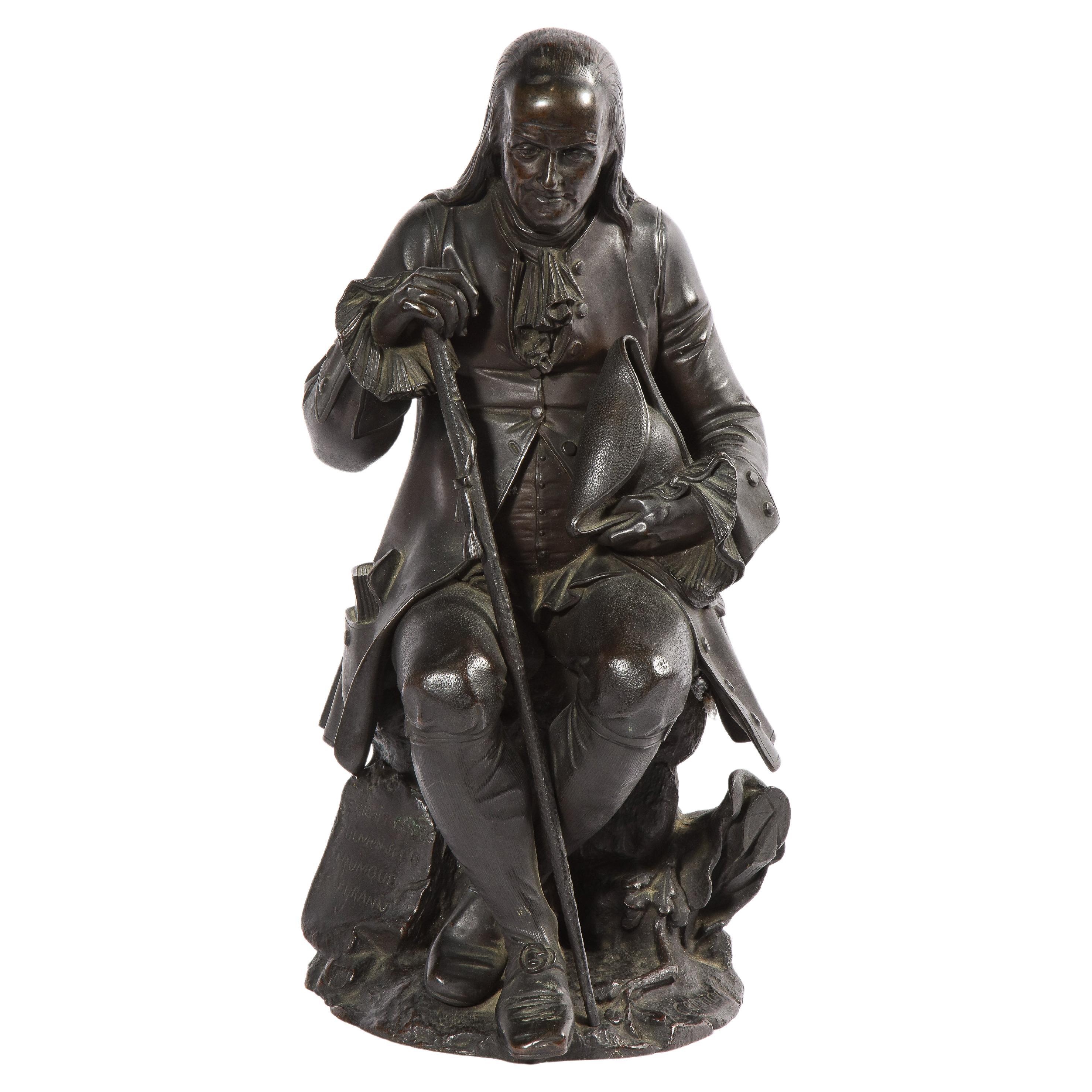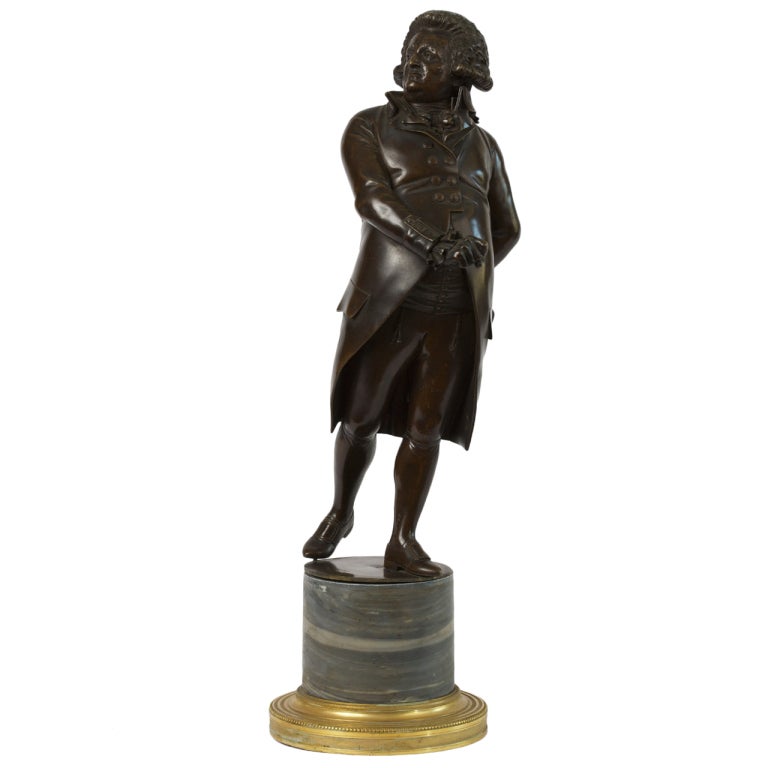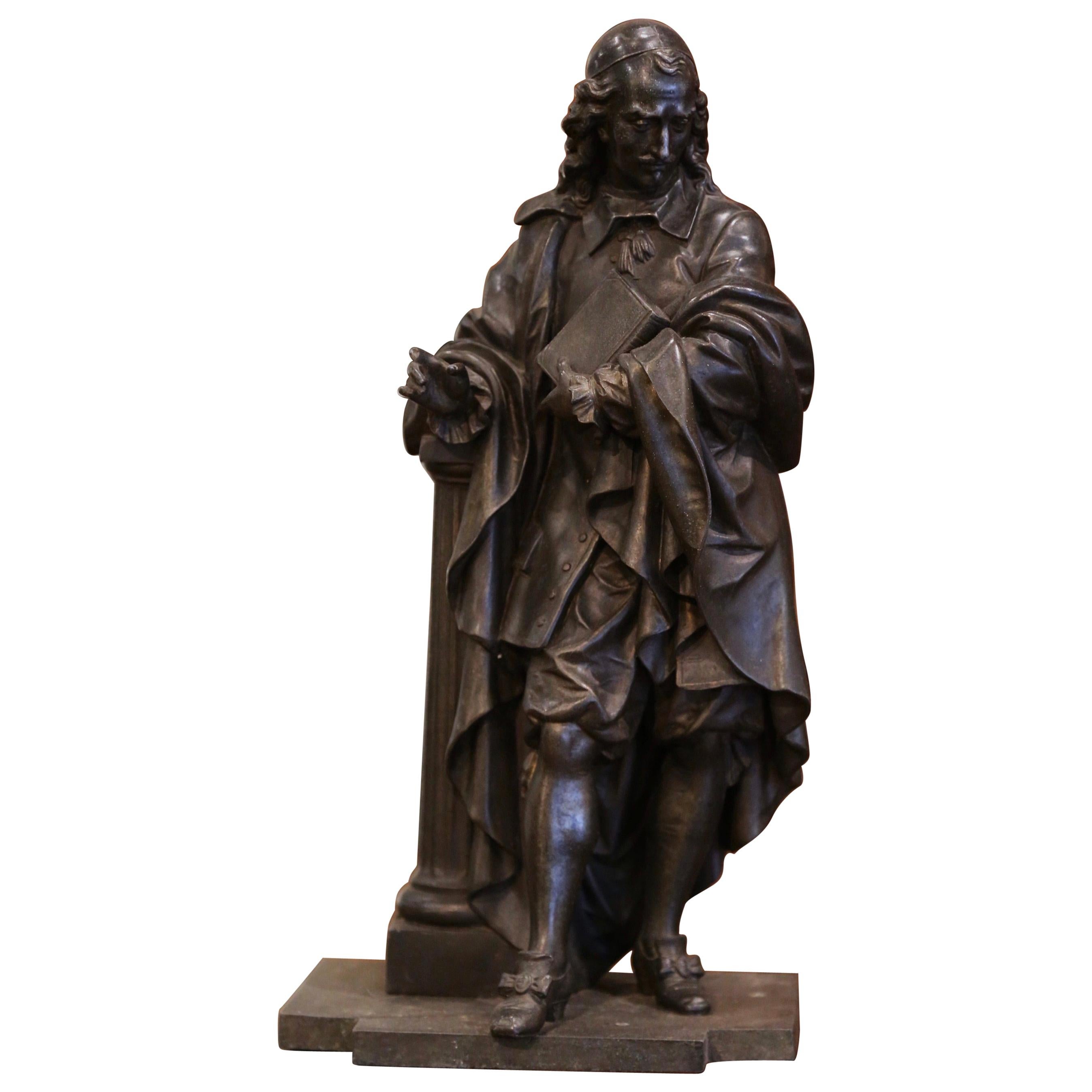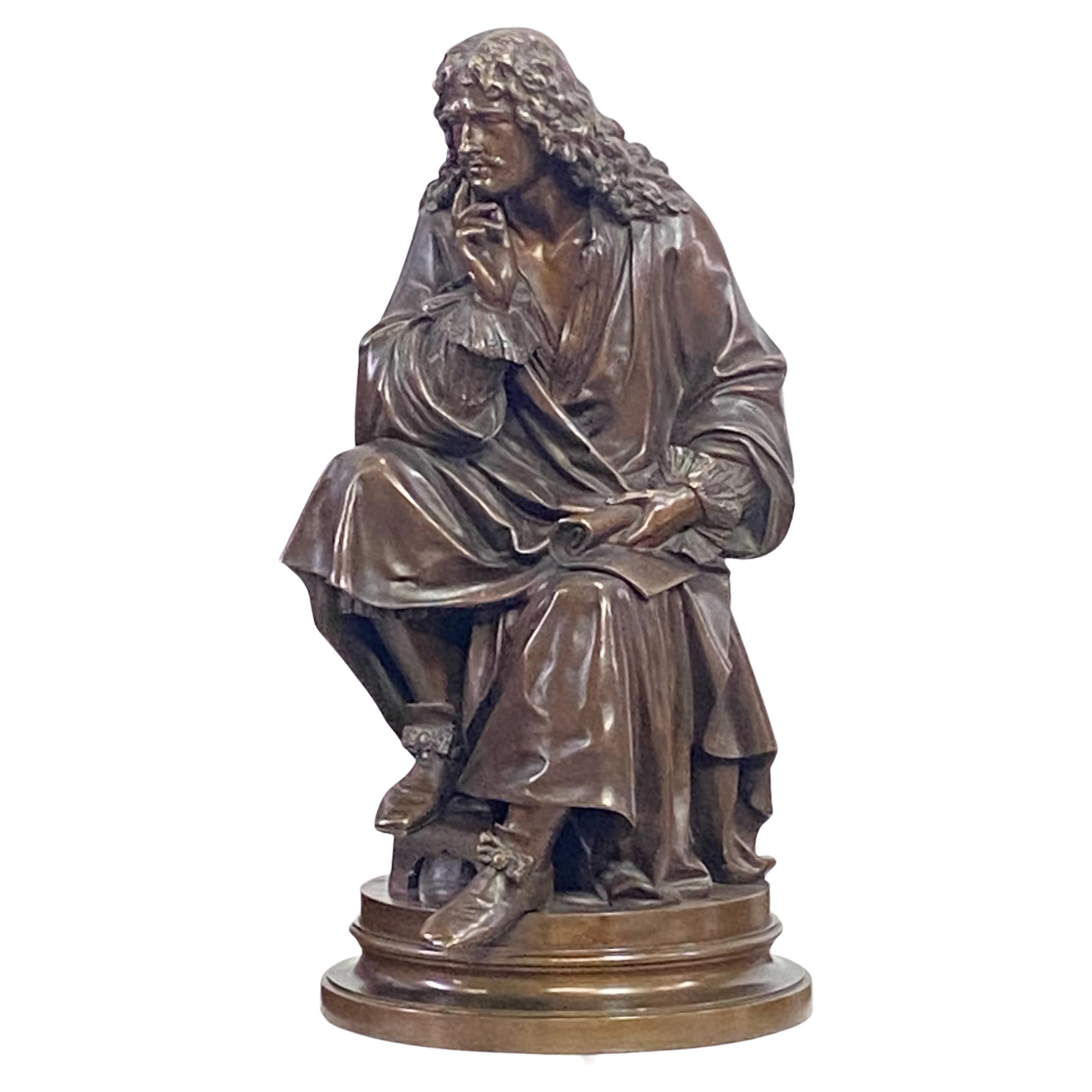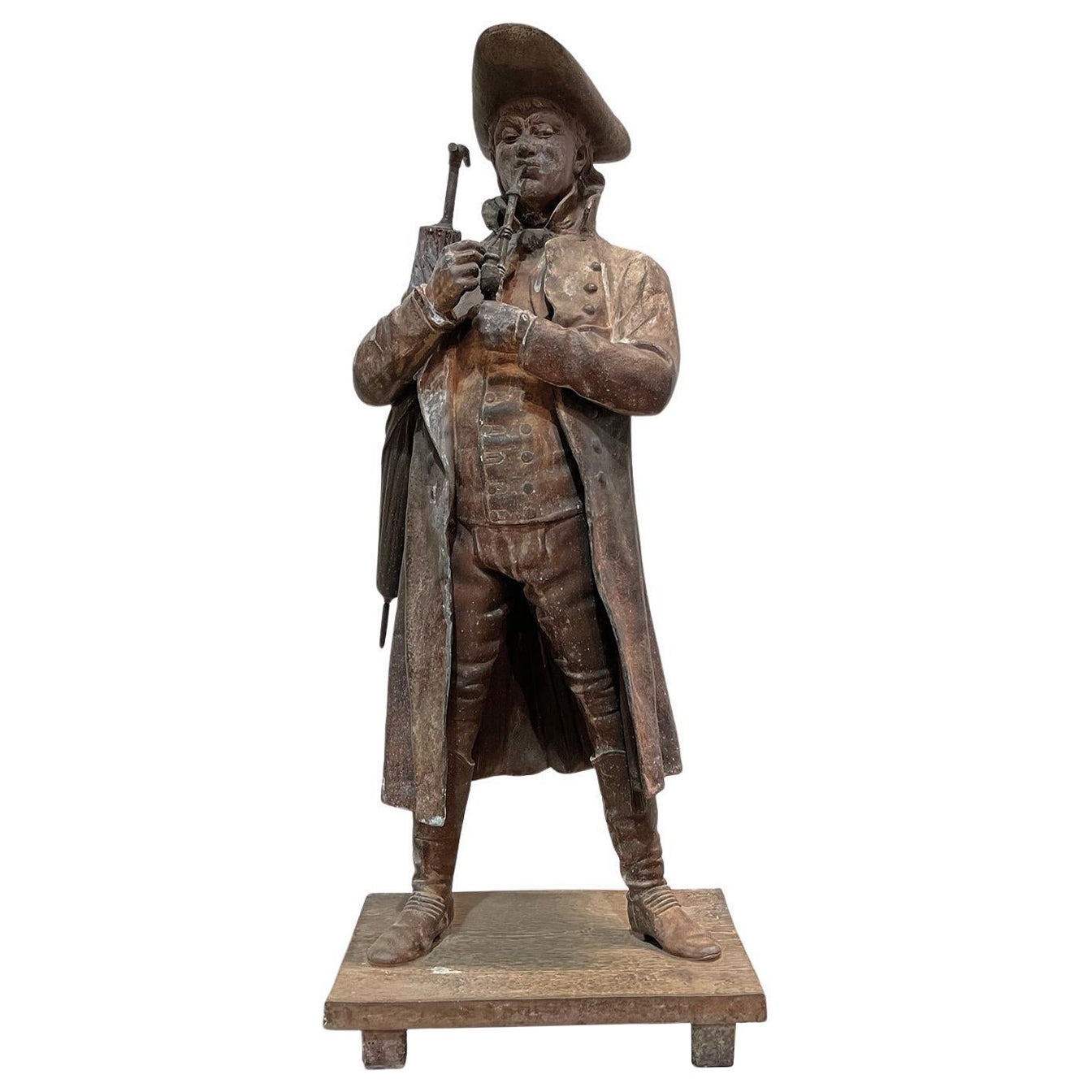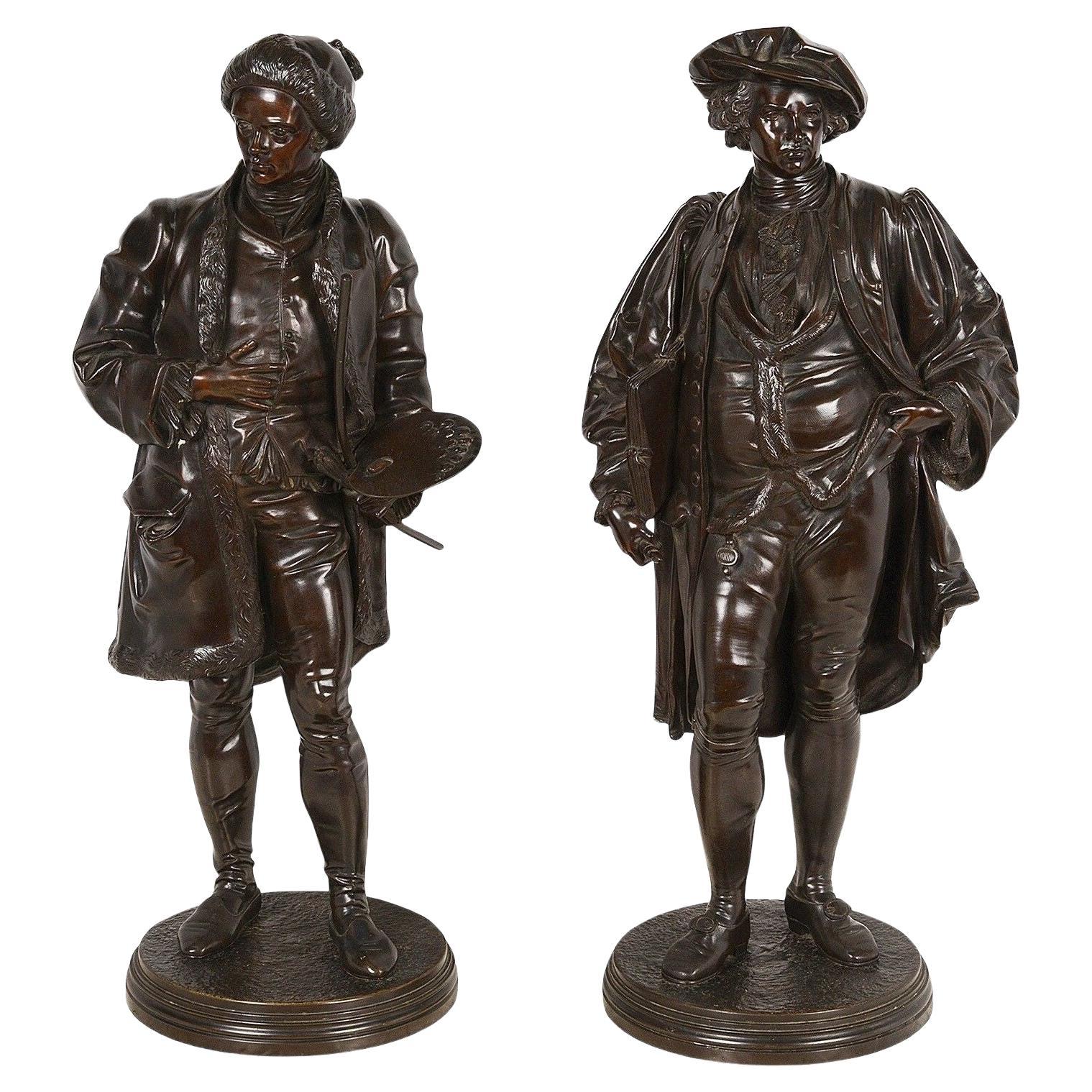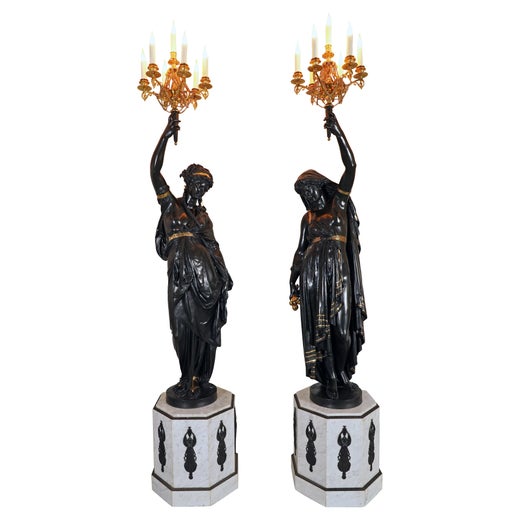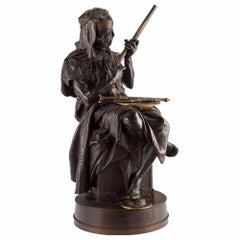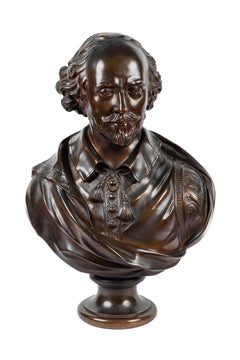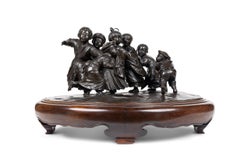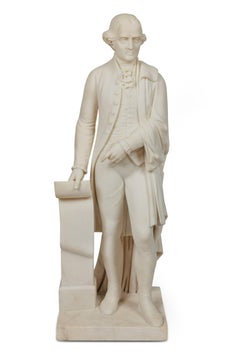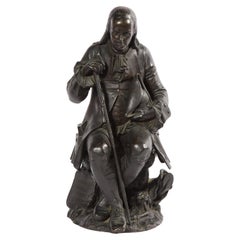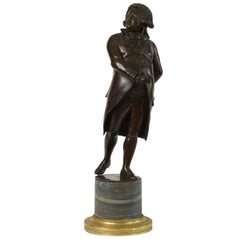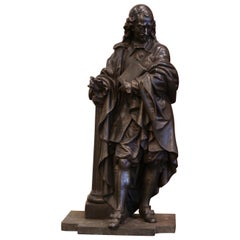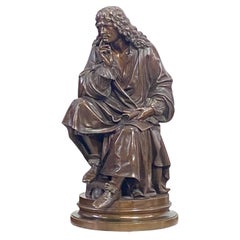Items Similar to Rare Patinated Bronze Sculpture of Benjamin Franklin, by A. Carrier-Belleuse
Want more images or videos?
Request additional images or videos from the seller
1 of 18
Albert-Ernest Carrier-BelleuseRare Patinated Bronze Sculpture of Benjamin Franklin, by A. Carrier-BelleuseC. 1870
C. 1870
$42,000
£31,787.49
€36,482.84
CA$59,832.49
A$64,889.75
CHF 34,082.56
MX$788,196.02
NOK 426,489.34
SEK 401,563.52
DKK 272,485.75
About the Item
Albert-Ernest Carrier-Belleuse (France, 1824-1887)
A rare seated bronze statue of Benjamin Franklin holding his walking stick and hat, with a book in his right jacket pocket inscribed "Science"
The base inscribed with the phrase "Eripuit Coelo fulmen scep trumque tyranis", attributed to French statesman Anne-Robert-Jacques Turgot, which translates to "He seized lightning from the skies and the scepter from tyrants".
A true collectors piece.
Signed on base "Carrier".
Measures: 15.5" high x 8" wide x 8.5" deep
Excellent condition. No damages noted. Ready to place.
Albert-Ernest Carrier-Belleuse, a highly prolific 19th-century French sculptor, created this depiction of Benjamin Franklin. He employed a large staff in his workshop, including a young Auguste Rodin, who was his chief assistant in the late 1860s. In 1876, Carrier-Belleuse became artistic director at the Sèvres Porcelain Manufacture. This statuette is a free adaptation, in a new pose, of François Marie Suzanne's sculpted portrait of Franklin from 1793. Suzanne’s statue was frequently reproduced, with variations of costume and poses.
A smaller version of this work is in the collection of the American Philosophical Society.
- Creator:Albert-Ernest Carrier-Belleuse (1824 - 1887, French)
- Creation Year:C. 1870
- Dimensions:Height: 15.5 in (39.37 cm)Width: 8 in (20.32 cm)Depth: 8.5 in (21.59 cm)
- Medium:
- Movement & Style:
- Period:
- Condition:
- Gallery Location:Queens, NY
- Reference Number:1stDibs: LU115129821242
Albert-Ernest Carrier-Belleuse
Albert-Ernest Carrier-Belleuse was a French sculptor. Carrier-Belleuse was born on 12th June 1824 at Anizy-le-Château, Aisne, France. He began his training as a goldsmith's apprentice. He was a student of David d'Angers and briefly studied at the École des Beaux-Arts. His career is distinguished by his versatility and his work outside France, in England between 1850–55 and in Brussels around 1871. His name is perhaps best known because Auguste Rodin worked as his assistant between 1864 and 1870. The two traveled to Brussels in 1871 and by some accounts, Rodin assisted Carrier-Belleuse's architectural sculpture for the Brussels Stock Exchange.
About the Seller
5.0
Platinum Seller
Premium sellers with a 4.7+ rating and 24-hour response times
Established in 1980
1stDibs seller since 2019
15 sales on 1stDibs
- ShippingRetrieving quote...Shipping from: Queens, NY
- Return Policy
Authenticity Guarantee
In the unlikely event there’s an issue with an item’s authenticity, contact us within 1 year for a full refund. DetailsMoney-Back Guarantee
If your item is not as described, is damaged in transit, or does not arrive, contact us within 7 days for a full refund. Details24-Hour Cancellation
You have a 24-hour grace period in which to reconsider your purchase, with no questions asked.Vetted Professional Sellers
Our world-class sellers must adhere to strict standards for service and quality, maintaining the integrity of our listings.Price-Match Guarantee
If you find that a seller listed the same item for a lower price elsewhere, we’ll match it.Trusted Global Delivery
Our best-in-class carrier network provides specialized shipping options worldwide, including custom delivery.More From This Seller
View AllEmile-Edmond Peynot "Albaya' El Tunsi" The Tunisian Merchant Bronze, 1883
Located in Queens, NY
Émile-Edmond Peynot, (French, 1850 -1932)
An exceptional, exquisite and rare orientalist bronze sculpture titled Albaya' El Tunsi / The Tunisian Merchant / The Arab rifleman.
Dep...
Category
19th Century Figurative Sculptures
Materials
Bronze
A Monumental French Patinated Bronze Bust of William Shakespeare, after Houdon
By F. Barbedienne Foundry
Located in Queens, NY
A Monumental French Patinated Bronze Bust of William Shakespeare, after Houdon, by F. Barbedienne Foundry, circa 1870.
Masterfully and realistically sculpted in solid bronze, this b...
Category
19th Century Figurative Sculptures
Materials
Bronze
A Large and Exceptional Japanese Meiji Period Tokyo School Bronze Sculpture
Located in Queens, NY
Presenting an extraordinary Large and Exceptional Japanese Meiji Period Tokyo School Bronze Sculpture depicting a delightful ensemble of six energe...
Category
19th Century Figurative Sculptures
Materials
Bronze
A Rare and Important American Marble Sculpture of Thomas Jefferson, Circa 1870
Located in Queens, NY
A Rare and Important American White Marble Sculpture of Thomas Jefferson Holding The Declaration of Independence. Circa 1870, in the Manner of Horatio Stone (1808 –1875).
Inscribed on scroll: 'The Declaration of Independence, It becomes necessary for one people to dissolve the political bands which have connected them with another. etc. etc. T. Jefferson.
The present work is unsigned but is reminiscent of Horatio Stone's life-size marble figure of John Hancock...
Category
19th Century Figurative Sculptures
Materials
Marble
A Monumental, Richly Patinated Bronze Bust of Beethoven by G. Leroux
By Gaston Leroux
Located in Queens, NY
A Monumental, Richly Patinated Bronze Bust of Beethoven by Gaston Veuvenot Leroux (1854-1942) & Eugène Blot, Fondeur
This magnificent sculpture powerfully captures the iconic compos...
Category
19th Century Figurative Sculptures
Materials
Bronze
A Rare Gilt and Patinated Bronze Jockey on A Horse, circa 1875
By Isidore Jules Bonheur
Located in Queens, NY
Isidore-Jules Bonheur (French, 1827–1901)
A Rare Gilt and Patinated Bronze Jockey on A Horse, circa 1875.
Introducing a truly exceptional and highly so...
Category
19th Century Figurative Sculptures
Materials
Bronze
You May Also Like
Rare Patinated Bronze Sculpture of Benjamin Franklin, by A. Carrier-Belleuse
By Albert-Ernest Carrier-Belleuse
Located in Queens, NY
Albert-Ernest Carrier-Belleuse (France, 1824-1887)
A rare seated bronze statue of Benjamin Franklin holding his walking stick and hat, with a book in his ri...
Category
Antique 19th Century French American Classical Figurative Sculptures
Materials
Bronze
Bronze Figure of a Standing Mirabeau After François-Marie Suzanne
By Francois-Marie Suzanne
Located in Kittery Point, ME
raised on a bronze-mounted cylindrical marble socle. With a Cleveland Museum of Art label underneath.
A plaster model signed Suzanne and dated 1792 was part of the David-Weill colle...
Category
Antique 19th Century French Sculptures
Materials
Marble, Bronze
19th Century French Patinated Spelter Statue of Cardinal Mazarin
Located in Dallas, TX
Decorate a study or office with this elegant antique statue. Crafted in France circa 1870 and built of metal, the figure depicts the cardinal Mazarin ...
Category
Antique Mid-19th Century French Louis XIII Figurative Sculptures
Materials
Spelter
Albert Ernest Carrier-Belleuse Bronze Molière Sculpture, 19th Century
By Albert-Ernest Carrier-Belleuse
Located in San Francisco, CA
A very fine bronze sculpture / model of Molière seated by Albert-Ernest Carrier-Belleuse (1824-1887). France, circa 1870.
Albert-Ernest Carrier-Belleuse was a French sculptor. Carri...
Category
Antique Late 19th Century French Busts
Materials
Bronze
$3,150 Sale Price
25% Off
19th Century French Antique Metal Sculpture, The Noble Man by L. Hollot
By L. Hollot
Located in West Palm Beach, FL
An antique statuary by L. Hollot French Sculpturor ( 1836 – 1897 ) representing a standing noble man with umbrella, in good condition. Created of Zamak with a very detailed craftsmenship and details. The sculpture is positioned onto a hand carved limestone pedestal...
Category
Antique Late 19th Century French Busts
Materials
Limestone, Metal
19th Century Bronze Statues of Hogarth and Reynolds
Located in Brighton, Sussex
A very good quality pair of 19th Century patinated bronze statues of Hogarth and Reynolds, signed Salmson. SALMSON, JEAN JULES (FRENCH, 1823-1902) Jean Jules Salmson...
Category
Antique 19th Century French Figurative Sculptures
Materials
Bronze
More Ways To Browse
Antique Bronze Sculpture Signed Art Sculptures
Antique Scepter
Carrier Belleuse
Statue Rare
Albert Ernest Carrier Belleuse
Benjamin Franklin
A Carrier Belleuse
Carrier Belleuse Bronze
A Carrier Sculpture
A Carrier Bronze
Benjamin Franklin Bronze
John Bratby
John Budicin
John Thomas Serres
John Wootton
Jon Schueler
Joseph Kirkpatrick
Julius Paul Junghanns
